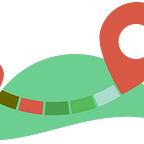Introducing Tortoise, Transforming Shared Scooters and Bikes into an Asset for Cities
Shared electric scooters and bikes represent the single biggest shift in how people get around since ridesharing took off a decade ago. Thousands of new players are raising billions in venture capital as we come to the realization that cars aren’t always the most efficient way to get from point A to point B.
While many love this new form of transportation, the reality is, often times it cannot be dependably relied on, because a scooter or bike isn’t always readily available at their location. Meanwhile, shared micromobility companies are fighting uphill battles with issues like sidewalk clutter, high operational overhead, poor unit economics, and mounting concerns from cities. We created Tortoise to solve some of the biggest challenges associated with shared electric bikes and scooters.
The Groundbreaking Technology Behind Tortoise
Tortoise isn’t another scooter company. We’re not building a new kind of scooter and we’re not an operator putting more units on the road. Instead, we want to make the existing operators across the globe more efficient and effective. By combining autonomous technology with remote human intervention, Tortoise has developed an easy, cost-efficient way to relocate small electric vehicles to the places where they’re needed.
We partner with cities to determine where a scooter can safely move autonomously at a low speed (like on an empty sidewalk) and where a human should remotely move the unit via a camera attached to the unit (like on a highly trafficked city block). With Tortoise, scooters can safely move from a location where it may be underutilized or obstructing the road, to a city-approved parking spot, a public transit hub, and even your front doorstep. The days of going on a wild-goose chase to find an electric scooter or bike are over, because they’ll now come right to you.
The Partnerships That Make Tortoise Possible
At Tortoise, our partnerships with cities and communities come first. We’ve already formed an early partnership with The City of Peachtree Corners, Georgia to demonstrate how our technology can make scooters a viable transportation option at Atlanta Tech Park, which struggles with heavy congestion during lunch hours.
“We’re excited to explore how Tortoise can make shared electric scooters and bikes a viable transportation option for the residents of Peachtree Corners. Tortoise addresses many of the major challenges and concerns expressed by people in the past and will transform shared micromobility into a valuable asset for our city and our residents.” — Brian Johnson, City Manager, City of Peachtree Corners
Video footage from Tortoise inaugural public demonstration in Peachtree Corners
In addition to our work with cities, we’re also working closely with the private sector. Tortoise has formed partnerships with several operators and manufacturers (OEMs) across the globe. Wind, Gotcha, CityBee, Go X, and Shared will be the first operators to deploy Tortoise in their respective markets to improve transportation in the cities that they operate in. Meanwhile, manufacturers like ACTON, Tronx Motors, Veemo and YIMI will incorporate Tortoise technology with the bikes and scooters that they develop for the operators.
“We are excited about our new partnership with Tortoise as it is a natural fit for Wind. It will allow us to keep sidewalks clean and safe for pedestrians, while delivering on our mission to always have a scooter within a 2 minute walk of a user ready to take a ride. This technology will enable us to provide the best mobility service for our users and the city authorities.” — Ed Schmidt, COO and EMEA CEO, Wind
The Urban Planners, Public Officials and Mobility Executives Behind Tortoise
We’re proud to introduce an advisory board that consists of prior public officials and city planning experts that can ensure we’re positively supporting cities every step of the way. Members of the board include Beverly Scott, the former CEO of several U.S. transit systems, including the Massachusetts Bay Transportation Authority (MBTA) and the Metropolitan Atlanta Rapid Transit Authority (MARTA), Brooks Rainwater, Director of the Center for City Solutions at the National League of Cities, Daniel Correa, the Obama Administration’s lead on smart cities, David Zipper, Visiting Fellow at the Harvard Kennedy School, Debra Lam, the Managing Director of Smart Cities at Georgia Institute of Technology, and Leah Riley, a managing director at Nelson Nygaard, a consulting firm focused on accessibility in transportation.
The idea for Tortoise came from its founders David Graham and Dmitry Shevelenko. David has a deep background in vision systems, robotics, electrical engineering and 3D printing. Recently, companies like Lyft, Microsoft and Samsung brought in David to develop cutting-edge technologies. Meanwhile, Dmitry led Uber’s expansion into new modes of transportation and initiated the first wave deals with companies like Jump Bikes, Getaround and the public transit ticketing system Masabi. Together, David and Dmitry have identified some of the biggest pain points in the mobility space and will use their deep background in the space to address them.
With today’s launch, Tortoise is just getting started on an exciting journey to build upon the next wave of transportation. Stay tuned as we continue to form new partnerships and expand our offering for riders and cities everywhere.
